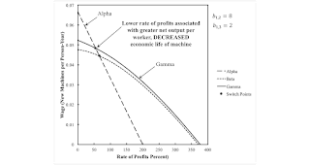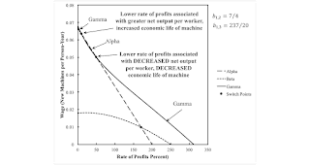1.0 Introduction I have been reading Robin Hahnel. Hahnel argues even more strongly than Steedman did that labor values are redundant. And he argues for the importance of the fundamental Sraffian theorem. I think this may be Hahnel's coinage. Anyways' this is my working my way through some of what I think he is saying. Hahnel has some interesting things to say, not discussed here, about analyzing environmental concerns in a Sraffian framework. I ignore the chapter in Hahnel (2017) on the...
Read More »Keynes And Robinson On Supposed Self-Regulating Markets
Here is John Maynard Keynes in 1926: "Let us clear from the ground the metaphysical or general principles upon which, from time to time, laissez-faire has been founded. It is not true that individuals possess a prescriptive 'natural liberty' in their economic activities. There is no 'compact' conferring perpetual rights on those who Have or on those who Acquire. The world is not so governed from above that private and social interest always coincide. It is not so managed here below that...
Read More »A History Of Production Processes In Volume 1 Of Capital
1.0 Introduction I have written many posts on formal results related to my favorite interpretations of the theory of value and distribution in Marx's Capital. But Marx's work is not solely about formalism. One aspect of volume 1 is a history of production processes up to Marx's day. Much opportunity exists to build on this history. Some have done this in works I have not read much of. I have been reading Soren Mau, and many years ago I read much of Charles Babbage's On the Economy of...
Read More »Perverse Switch Point For Austrian Economics
Figure 1: The Wage-Rate of Profits Frontier This post continues a series of posts demonstrating that the change in the economic life of a machine at a switch point is independent of the change of the capital intensity of the technique at a switch point. I here fill in the lower left in a a two-by-two table. The wage curves above are for the an example with the same structure as in the previous post in this series.This is a 'one-good' model. The manager of firms know three processes to...
Read More »Keynes And Marx
1.0 Introduction John Maynard Keynes had some amusing jibes against Marx, but does not provide any substantial argument against the theory in Marx's Capital. In fact, one can draw parallelisms between elements of Keynes' and Marx's theories. This post provides a brief start on justifications for these assertions. 2.0 Jibes Keynes' most explicit and most well-known statement about Marx is probably this: "How can I accept a doctrine which sets up as its bible, above and beyond criticism,...
Read More »Traditional And ‘Perverse’ Switch Points For Austrian And Neoclassical Economics
Figure 1: The Wage-Rate of Profits Frontier1.0 Introduction This is one in a series of posts demonstrating that the change in the economic life of a machine at a switch point is independent of the change of the capital intensity of the technique at a switch point. I want to illustrate each entry in a two-by-two table in a previous post. The example in this post has two switch points. One fits the traditional Austrian and neoclassical stories, as in the entry in the upper-left of the table....
Read More »Elsewhere
Matt McManus on Thomas Sowell. A review of Adam Shatz's biography of Frantz Fanon. Nathan Robinson interviews Kohei Saito on degrowth. I have not read Bob Rowthorn on neo-ricardianism in decades. I wish NLR made PDFs of old articles freely available.
Read More »To Do: Perverse Switch Points And The Economic Life Of A Machine
Table 1: Lower Rate of Profits Around A Switch Point Traditional Marginalist Story'Perverse' Marginalist StoryTraditional Austrian StoryNegative real Wicksell effect, greater net output per workerPositive real Wicksell effect, smaller net output per workerLonger economic life of machineLonger economic life of machine'Perverse' Austrian StoryNegative real Wicksell effect, greater net output per workerPositive real Wicksell effect, smaller net output per workerShorter economic life of...
Read More »New Interpretations Of Marx
This post is basically complaining that I cannot keep up. I think I am fairly informed on Karl Marx. I do not read German, and I have not even read some early works. My area of concentration is reading Capital as a work of mathematical economics, which cuts against the subtitle and, maybe, de-emphasizes a break with classical, especially, Ricardian political economy. More generally, I thought Marx generally praises the tremendous increase of productivity brought about by the...
Read More »Labor Values And Invariants
1.0 Introduction This post is an attempt to work through some linear algebra that some have used to understand Karl Marx's Capital. I have recently explained how, in a simple model, prices of production are equal to labor values if the organic composition of capital does not vary among industries. That special case is the setting of volume 1. In capitalism, workers rent themselves out to their employers. They work longer, under the dominion of capital, than needed to produce the...
Read More » Heterodox
Heterodox


